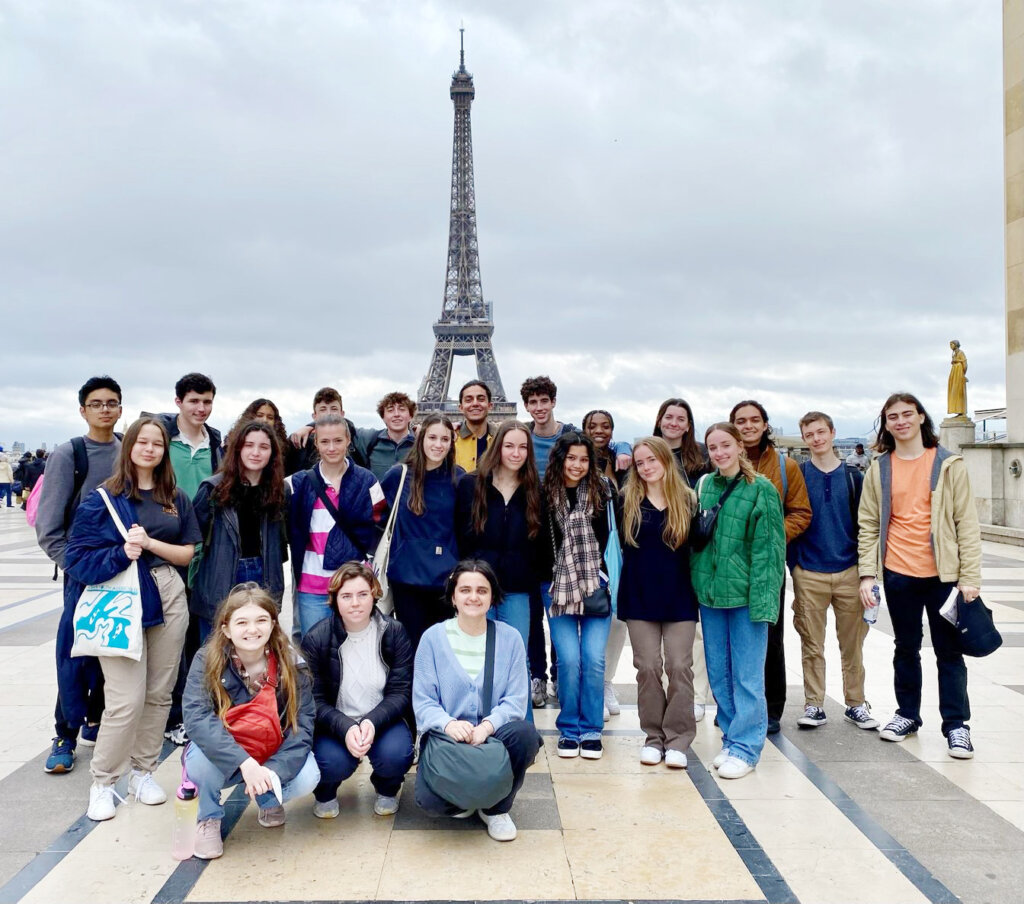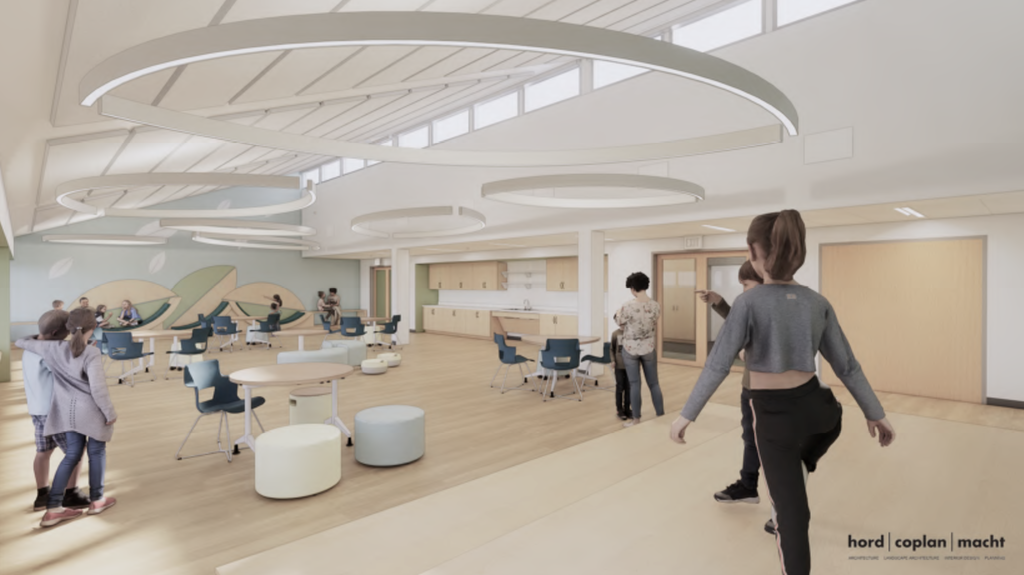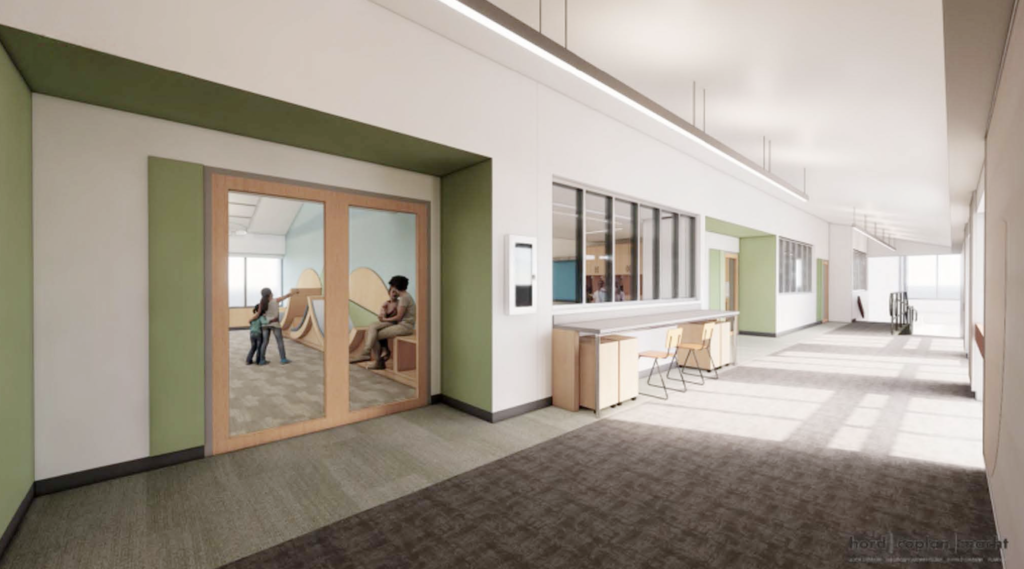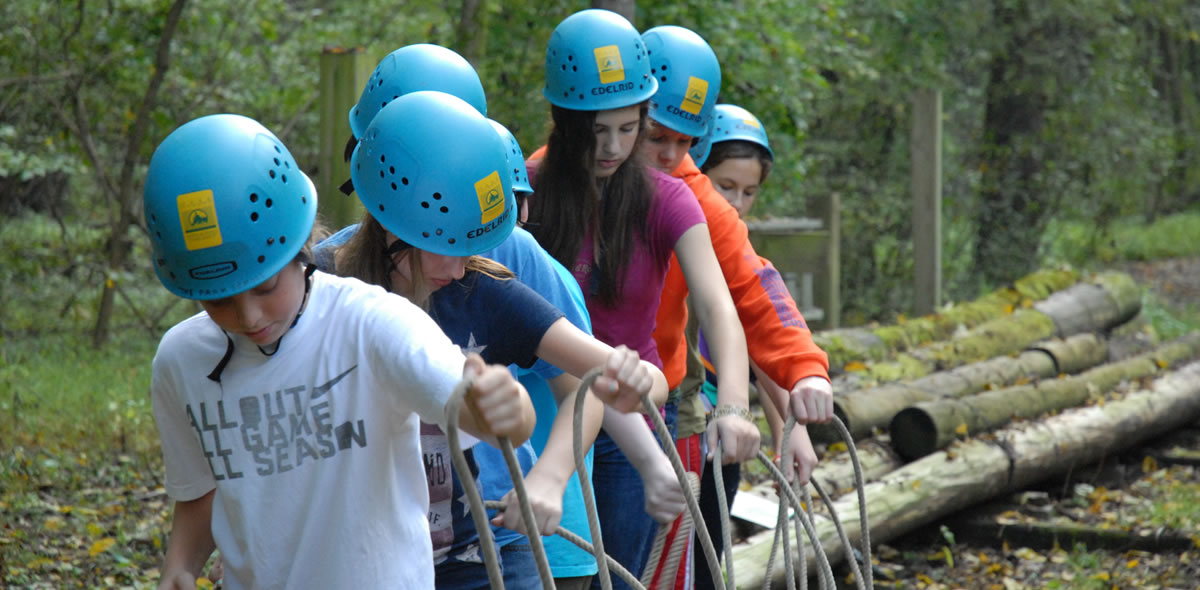Modern Language
The goal of the modern language department is to prepare students to communicate successfully with Chinese, French, or Spanish native speakers.
The department expects that students completing the program will be able to speak, write, read, and understand the language at a level which allows them to meet practical and social needs in a Chinese, French, or Spanish environment.
Students study Chinese, Spanish, or French in the ninth grade and may add a second language in the tenth, eleventh, or twelfth grades, space permitting. New students with previous language study will be placed in the appropriate course where the department feels they will be most successful based on an evaluation given in the spring. All students wishing to add a second language in the tenth grade must meet with the department chair in advance.
Students typically have the opportunity every other year to participate in exchange programs in China, France, and a Spanish-speaking country, such as Mexico or Spain. While abroad, they live with host families, attend classes at our sister schools, and visit museums and other places of interest. Back in Baltimore, they typically act as hosts when their exchange partners visit Park. Participation is dependent on approval of the faculty.
Requirements and Placement
Successful completion of Chinese 3, French 3, or Spanish 3 is required for graduation.
French, Spanish 2, and Spanish 3 are all divided by level of challenge, and students are placed in sections according to their performance in the preceding year’s class or on placement assessments. Students in accelerated sections work at an advanced level in all skills.
Two programs are available in Grades 11 and 12. Students may choose electives or, with departmental approval, enroll in an intensive course in Spanish that prepares them for the AP exam. All of the courses emphasize cultural themes, communication proficiency, and grammar review, as well as opportunities to use the language in a variety of contexts.
Program
- Chinese 1, 2, 3, Junior and Senior Elective
- French 2, 3, Intensive French, Junior and Senior Elective, Advanced Topics in French
- Spanish 1 (when possible), 2, 3, Intensive Spanish, Junior and Senior Electives, Advanced Topics in Spanish
Bilingual and International Students
Bilingual and students and heritage speakers entering the Upper School are encouraged to enroll in a language other than the one(s) they already speak. A bilingual English-Spanish student is encouraged to enroll in Chinese or French. Similarly, a bilingual English-French student is encouraged to enroll in Chinese or Spanish. A bilingual English-Chinese student is encouraged to enroll in Spanish or French. Students may begin doubling in language in 10th grade.
Bilingual students or heritage speakers wishing to hone their communication skills and enroll in the language they speak must take a placement test to determine their level. Any student placed into Level 3/3A must take at least two years of the language (through 10th grade); students may also begin another language and complete through Level 3.
International students for whom English is their second language are not required to enroll in a modern language during their first year in the Upper School. We understand that for these students immersing themselves in an American school fulfills the objectives of a modern language class. Beginning in their second year, however, these students are required to begin the study of Chinese, Spanish, or French. These students are required to continue their study of Chinese, Spanish, or French through Level 2.
International students who are here for only one year are encouraged to enroll in a modern language class keeping in mind the requirements they must meet for their home school.
Chinese
Chinese 1
Grades: 9-12
Chinese 1 is the introductory course of Chinese language and culture. Students are expected to become proficient at Pinyin (the phonetic system), learn to communicate with people on simple, everyday topics, and recognize approximately 400 characters by the end of the year. Although writing is not a major emphasis, students are expected to be able to write around 100 characters after the first year. Equally important is the study of culture. Students learn about Chinese traditions, history, geography, and popular culture. Class activities include presentations, songs, movies, and role-playing.
Chinese 2
Grades: 9-12
This course is a continuation of Chinese 1. Students continue to focus on various aspects of Chinese culture, and as they practice hearing and producing the four tones and expand their vocabulary, they learn to talk about additional topics, including hobbies, school life, and trips. In reading, they learn 400 new characters, giving them a total of 800 characters by the end of the year. Students are able to copy accurately, with the proper stroke, and sequence characters that are new to them. By the end of the year, they are able to write 200 characters without a model. Prerequisite: Chinese 1.
Chinese 3
Grades: 10-12
Chinese 3 is a continuation of Chinese 2. It is taught mainly in Chinese, while English is only used to explain grammar and introduce aspects of culture. Students are expected to be proficient and accurate in the four tones and Pinyin. They continue to expand their vocabulary and learn another 400 characters during the year. By the end of the year, they are expected to be able to communicate with native speakers on many topics, especially those related to everyday life. Included in the goals for the year is expanded listening comprehension with an emphasis on understanding more rapid speech. Some of the goals for students in the class are: to expand their listening comprehension, to be more comfortable understanding rapid speech, and to have a deeper understanding of China and its people. Prerequisite: Chinese 2.
French
(Re) Introduction to French (French 1)
Grades: 9–12
This course is geared towards students who took French in Middle School and need more time and exposure to build a strong foundation to be ready for level 2, as well as towards true beginners. In this course, students will acquire communicative skills and cultural knowledge in order to engage in a variety of everyday situations while discovering the diversity of the Francophone world. In addition, this course will develop the tools and habits of mind for students to become independent language learners. Students will work on all four communication skills with an emphasis on oral proficiency. Culture is integrated into all aspects of the program, and students are encouraged to speak French in the classroom.
French 2
Grade: 9 • Required
In this language and culture course, students build on their French 1 or Middle School French foundation. The course takes a thematic approach to language learning and recognizes the relationships between cultural awareness, communication, vocabulary acquisition, and grammar. An emphasis is placed on cultural competency and oral proficiency, with assessments incorporated into the program. Class content is based on the topics of everyday life. Activities include listening to songs, engaging in conversations, writing short compositions, and reading personal narratives. Students are expected to use French in the classroom.
French 3
Grade: 10 • Required
This class follows the same integrated approach used in French 2. Students build upon their knowledge of French language and their understanding of French-speaking cultures around the world. They are expected, with support, to read and write more independently and to make connections based on previous knowledge. Class content is based on cultural themes (e.g., secularism, folklore, music, the environment) and may vary depending on the year. Cultural competency and oral proficiency are still emphasized. In the accelerated section, students are expected to communicate with greater accuracy and to develop their ideas more fully. Prerequisite: French 2.
Spanish
Spanish 1
Grade: 9-12
In this introductory course, students will acquire the communicative skills and cultural knowledge to be able to engage in a variety of practical situations while discovering the diversity of the Spanish-speaking world. In addition, this course will develop the tools and mindset to become independent language learners. Students will work on all four communication skills with an emphasis on oral proficiency. Culture is integrated into all aspects of the program, and students are encouraged to speak Spanish in the classroom.
Spanish 2 and Spanish 2 (Accelerated)
Grade: 9 • Required
In this course, students build on their Middle School or Spanish 1 foundation and continue to develop their interpersonal communicative skills and to deepen their cultural knowledge. Through authentic materials, students continue to explore the depth and diversity of the Spanish-speaking world. This course will review strategies for language learning so that students will continue to build their tools and mindset to be independent language learners. Grammar and vocabulary are integrated into thematic units. Students are expected to use Spanish in the classroom. The accelerated course moves at a quicker pace, and students tackle more complex texts and material. Students in the accelerated class are expected to work more independently and with less support.
Spanish 3 or Spanish 3 (Accelerated)
Grade: 10 • Required
In Spanish 3, the curriculum shifts towards a thematic and integrated approach. Students are expected, with support, to read and write more independently, to make connections based on previous knowledge, and to see the language as an integrated whole. Through the use of authentic texts and films, students learn new vocabulary and grammar, and, as they consider the themes presented, apply and expand their knowledge. In the accelerated section, students will be expected to communicate with greater accuracy and develop their ideas more fully. Prerequisite: Spanish 2
Intensive Spanish Language and Culture (Accelerated)
Grades: 11
The focus of this course is the acquisition of a high degree of communicative and cultural competency in Spanish. The approach is a thematic one in which students consider, through the vehicle of films, literary texts, newspaper articles, podcasts, etc., topics related to global challenges, science and technology, and personal and public identities. Students will strengthen their interpretive, interpersonal, and presentation skills while reinforcing their knowledge of grammar and expanding their vocabulary. This course prepares students for the Advanced Placement (AP) Spanish Language and Culture examination in the spring. Prerequisite: Spanish 3 Accelerated and permission from the department.
Chinese
Modern Chinese History
Grades: 11-12
In this course, students will focus on modern Chinese history. Topics will include the late phase of Qing Dynasty, the “Century of Humiliation,” the Civil War, in addition to the rise of China in recent decades, etc. Emphasis will be placed on discussion, research, and independent work. Through this content-based course, students will gain a deeper understanding of China and its people while they continue to improve their language skills. Prerequisite: Chinese 3 or the equivalent. This class is offered in alternate years and will be offered this year.
Ancient Chinese History
Grades: 11-12
In this course, students focus on ancient Chinese history, which to some degree has shaped who the Chinese people are today. Topics include most famous dynasties such as Han and Tang, influential thinkers including Confucius, a taste of ancient poetry, and some interesting events that took place over thousands of years. An emphasis is placed on discussion, research, and independent work. Through this content-based course, students gain a deeper understanding of China and its people while they continue to improve their language skills. Prerequisite: Chinese 3 or the equivalent. This class is offered in alternate years and will not be offered this year. It will be offered in 2024-2025.
French
L’immigration vue à travers le Cinema Francais
Grades: 11-12
This course will focus on the portrayal of immigration through Francophone Cinema. Students will study the major contributions of Francophone cinema through the themes of migration/immigration, marginalization, and discrimination. They will explore contemporary Francophone cinema using a range of different aspects such as racial, cultural, religious, socio- economic, national, and linguistic elements. The class will pay particular attention to the ways that immigration through cinematic lenses includes patterns of ethnicity, gender, class, race, otherness, and structures of identity. Students will also be able to explore some of the main references of contemporary Francophone Cinema such as movements, styles and principal genres. The students will be able to write about films, and respond to weekly films and readings, demonstrating an understanding of basic concepts and theories related to international migration and cinematic representation. Prerequisite: French 3 or French 3 Accelerated
Grammaire, Gastronomie et Géographie: Retour aux Fondamentaux Francophones (Accelerated)
Grades: 11-12
In this course, students will learn about the rise and fall of the French language as “Lingua Franca.” Despite its decline, students will explore the lasting impact of French by studying the geography of the spaces where it is still spoken. The comprehensive study of climate, soil, maritime location, relief, and overall topography will also offer students a better understanding of francophone gastronomy. Historical background will be taught to realize the impact of colonization on food — the way beef made its way through Vietnamese phö soup, or the reason for the more pronounced bitterness of French Roast coffee. Throughout the semester, students will complete daily grammatical drills to review foundational aspects of French grammar and learn new and more advanced grammatical structures to enrich their language skills. Prerequisite: French 3 or French 3 Accelerated
Advanced Topics in French 1 (Accelerated) – Immigration et Identité Française
Grade 12
This course will explore the relationship between immigration and national identity in France as portrayed in various media outlets. Students will examine the complex concept of “Frenchness” through a wide range of contemporary media resources including, but not limited to, films, documentaries, blogs, podcasts, radio, television, music, and print media. What determines the meaning of French identity and who is and isn’t excluded from the sphere of Frenchness? The class will become more familiar with key events and concepts central to current debates about immigration and national identity. Students will discuss and debate a multitude of relevant, real-world topics relating to immigration and national identity. This course will facilitate students to gain insight into contemporary issues surrounding the topics of French National Identity and immigration in France today.
Spanish
Advanced Topics in Spanish 1 (Accelerated) – Introducción al cine Latinoaméricano
Grade 12
This course focuses on the representation of Latin American society in film and the relationship between film and culture, gender, politics, and economics. Students will describe, analyze, and evaluate film form and content in movies of different genres from major cinematic periods: silent cinema, studio cinema, Neorealism, the New Latin American cinema, and contemporary cinema. Furthermore, students will learn about the different modes of film production by situating them in national, regional, and global contexts. This class will be conducted entirely in Spanish. Prerequisite: Intensive Spanish
Descolonizando la comida
Grades: 11-12
This class centers on the historical and cultural background of the foods from Latin America, the Caribbean, and Spain. Students will learn about the origins of foods from those regions, the cultural influences and different traditions, as well as why food is so important in Hispanic culture. Students will discover this information through the examination of historical, literary, digital, and visual materials and will ideally have the chance to develop their culinary expertise! Prerequisite: Spanish 3
Los deportes y la sociedad: España, Argentina y los Estados Unidos (Accelerated)
Grades: 11-12
This course offers an exciting opportunity for students to delve into the vibrant world of sports in two Spanish-speaking countries: Spain and Argentina. Conducted entirely in Spanish, the course aims to enhance students’ language proficiency while exploring the historical, cultural, and sociopolitical dimensions of sports in these nations. The class will also cover relevant grammatical concepts, but will mainly focus on the connection between organized sports, politics, and cultural significance. Prerequisite: Spanish 3 Accelerated or Regular Elective and permission from the department.
Chinese
Chinese 4: Chinese Culture Past and Present
Grades: 11-12
In the spring semester, students continue to learn Chinese language through the study of Chinese culture covering topics ranging from Chinese medicine to music, education, and other topics of contemporary society. An emphasis is placed on discussion, research, hands-on projects, and independent work. Through this content-based course, students gain a deeper understanding of China and its people while they continue to improve their language skills. Prerequisite: Chinese 3 or the equivalent. This class is offered in alternate years and will not be offered this year. It will be offered in 2024-2025.
Chinese Society Through Film
Grades: 11-12
In the spring semester, students will learn about Chinese society through the study of Chinese films that cover topics ranging from ancient and modern history to the educational system to growing up in China, etc. Emphasis will be placed on discussion, research, and independent work (e.g., film reviews). Through this content-based course, students will gain a deeper understanding of China and its people while continuing to improve their language skills. Prerequisite: Chinese 3 or the equivalent. This class is offered in alternate years and will be offered this year.
French
L’Identité française, c’est quoi?
Grades: 11-12
Morocco has been a vibrant center of Jewish life for millennia; the Jewish population of Morocco was at its peak in the ’40s reaching almost 300,000 people. The Jewish population in Morocco was the biggest non-Ashkenazi community in the world and the largest Jewish community in the Muslim world. This course will explore Francophone Moroccan-Jewish voices through their narratives of cultural Moroccan Jewish Heritage. This course will introduce through Francophone Moroccan Jewish literature, music, documentaries, and films, the diverse influences of Francophone Moroccan Jewish Cultural Heritage in Morocco, and in other Francophone societies such as Canada and France. The students will have the opportunity to research, discuss, and reflect on many aspects of the historical, social, and cultural background of what was once the largest Jewish community in a Muslim country and the distinct Moroccan Jewish culture that has developed over the centuries. Prerequisite: French 3 or French 3 Accelerated
Advanced Topics in French 2 (Accelerated) – La F/francophonie et L’Afrique Francophone
Grades: 11-12
This course will take a deep dive into the institutionalization of the French language and the power of the language itself as a weapon of diplomacy. It will then focus on deconstructing the process of colonization by going all the way back to the 9th-century Arabic slave trade in order to understand how Francophone Africa and the African Diaspora in hexagonal France currently exist. This course will have a special emphasis on the study of colonial armies during WW2 and 21st century films that allowed their stories to be told and partial reparations to be made. Alongside this instruction, students will be working on a comprehensive project regarding a country of their choice from Francophone Africa. Students will improve their speaking and collaborative skills through hands-on and oral communicative activities as well as field trips. Prerequisite: Intensive French
Spanish
Arte, Música y Cultura de Venezuela
Grades: 11-1
This course provides an overview of the rich cultural heritage of Venezuela, focusing on its art, music, and cultural traditions. Through a combination of readings, discussions, and multimedia presentations, students will gain an understanding of the historical, social, and political contexts that have shaped Venezuelan culture. By the end of the course, students will have a broad understanding of the unique cultural traditions of Venezuela, as well as an appreciation for the ways in which these traditions continue to evolve. Prerequisite: Spanish 3
Cine Latinoaméricano (Accelerated)
Grades: 11-12
In this class, students will watch, describe, analyze, and evaluate the connection between film form and content in several contemporary Latin American films. The class will cover various topics related to social, historical, cultural, and pop-cultural events. The variety of films and activities will expand our understanding of the cultural diversity within the Spanish-speaking world. Class activities will include visual analysis, research, reading, discussions, writing, and role-playing. At the same time, students will develop interpretive skills, increase their knowledge of idiomatic expressions, enhance their listening skills, review grammar, and improve their writing skills. This class has been designed for advanced students, and it will be conducted entirely in Spanish. Prerequisite: Spanish 3
Advanced Topics in Spanish 2 (Accelerated) – “Perspectivas Culturales e Históricas de España”
Grades: 11-12
In this class, students will explore contemporary literature, visual culture, and digital media produced in or about the Hispanic Caribbean (Cuba, Puerto Rico, and the Dominican Republic). Through the examination of a diversity of cultural manifestations, including short stories, paintings, murals, films, and performances, students will be exposed to multiple interpretations of concepts such as citizenship and gender, sexual, and racial identities in the Hispanic Caribbean and its diasporas. Prerequisite: Intensive Spanish
Los deportes y la sociedad
Grades: 11-12
This course offers an exciting opportunity for students to delve into the vibrant world of sports in two Spanish-speaking countries: Spain and Argentina. Conducted entirely in Spanish, the course aims to enhance students’ language proficiency while exploring the historical, cultural, and sociopolitical dimensions of sports in these nations. The class will also cover relevant grammatical concepts, but will mainly focus on the connection between organized sports, politics, and cultural significance.




